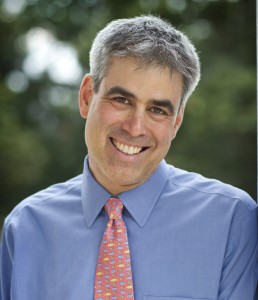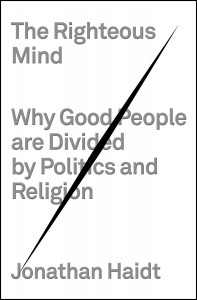Jonathan Haidt Answers Your Questions About Morality, Politics, and Religion
 A while back, we solicited your questions for social psychologist Jonathan Haidt, author of The Righteous Mind: Why Good People Are Divided by Politics and Religion. (He recently appeared on The Colbert Report.)
A while back, we solicited your questions for social psychologist Jonathan Haidt, author of The Righteous Mind: Why Good People Are Divided by Politics and Religion. (He recently appeared on The Colbert Report.)
Below are his responses about confirmation bias in religion, the “score” of our morals, the power of branding, how his research has made him a centrist, and how the search for truth is hampered by our own biases. Big thanks to him and all our readers for another great Q&A.
Q. Why is it that both “sides” of the religion/atheism debate have what appears to be a systemic insistence on talking past each other, each one constructing a straw man of the other, beating that into submission, and then smugly declaring victory? Clark W.
A. Public debates often look like professional wrestling matches, except that in wrestling the combatants are just pretending to hate each other. In the religion-atheism debate, they really see each other as evil, and so they feel free to use more low-blows and illegal holds than do wrestlers.

The first principle of my book is “intuitions come first, strategic reasoning second.” This means that we all have quick gut feelings which point our thinking in one direction. We then send our reasoning out to search for confirming evidence only (this is called “the confirmation bias”). We almost always find SOME evidence to support our initial inclination. The other side is doing the same thing.
Now, let’s add in the third principle of the book: “morality binds and blinds.” People who share sacred objects and then circle around them can then trust each other and function more effectively, particularly in intergroup competition. I believe this is in fact why we evolved to be religious. But the sacred thing at the center does not have to be a god. It can be a flag, a book, an ideal, or a social institution such as marriage or science. The New Atheists are mostly men of science, or men who claim to speak for science. But when you make science sacred and then claim to speak for it, something very unfortunate happens: you don’t just think your opponents are wrong, you think they are stupid, and you adopt an arrogant and dismissive tone. You’ve got science on your side, after all. (I argue in my book that the New Atheists get the science mostly wrong.) The religion/atheism debate is therefore particularly prone to straw men and smug declarations.
Q. You say you used to be a liberal but are now a centrist. Why the change? Vincent.
A. I have the personality traits, occupation, social network and lifestyle of a liberal. It was over-determined that I would be a liberal. But in 2005 I changed my research direction. I had previously studied how morality varied across nations. After a second Democratic challenger lost to George W. Bush, in part because they failed to make compelling moral arguments, I began to study left and right in the USA as though they were different cultures. Which they are. I tried to apply a cultural psychology framework to the research, meaning that I tried to understand each side from inside. I tried to get a feel for what each side held sacred, and for what values and virtues they were trying to implement in their political and economic programs. At first I disliked watching Fox News and reading National Review. But within a year, I began to see that the conservative vision of morality, history, and economics was just as coherent as the alternative liberal vision.
Once I lost my feelings of repulsion and anger toward conservatism I discovered a whole world of ideas I had never encountered. Some of them struck me as quite good, e.g., the value of institutions and traditions for creating moral order; the principle of federalism (which failed spectacularly on civil rights, but is valuable in most other cases); and the glorification of earned success while being critical of efforts to achieve equality of outcomes without attention to merit. I now hold the view that left and right are like Yin and Yang. As John Stuart Mill put it in 1859: “A party of order or stability, and a party of progress or reform, are both necessary elements of a healthy state of political life.”
Q. How well can you predict a person’s degree of liberalism/conservatism based on his/her moral value scores? Andy
A. A person’s scores on our surveys at YourMorals.org can help us predict where they are on the left-right dimension fairly well. The Loyalty, Authority, and Sanctity foundations in particular show high correlations (between .4 and .6) with left-right self-placement. But the exciting thing for us is that having the six foundation scores lets us see way beyond the one-dimensional left-right scale.
In a recent paper led by Sena Koleva, we analyzed people’s attitudes on culture war issues and found that knowing a person’s moral foundation scores often tells you more about their political attitudes than does knowing how liberal or conservative they are. More importantly, moral foundation scores point you to some of the underlying motives at work. For example: you won’t be surprised to learn that people who oppose flag burning as a form of political expression are more conservative, and they score higher on the Loyalty foundation (which picks up their patriotism). But the big surprise for us was that the Sanctity foundation was just as big a predictor as their ideological self-placement. Some people see sanctity in physical objects, such as flags, which must be protected from desecration.
The Sanctity foundation was the most powerful predictor of attitudes on many culture-war issues, particularly abortion, biomedical issues (such as stem cell research) and sexual issues. And it predicted attitudes well even after partialling out ideological self-placement. The moral foundations give you much better resolution for political analysis and persuasion than does simply knowing if a person is liberal or conservative. (You can get the paper by going to JonathanHaidt.com and requesting publication #87)
Q. Do you think that businesses are consciously harnessing our “groupish” nature to develop brand loyalty? Is it possible to do so? Is it ethical? Erin
A. Yes, many businesses do this, and those who could do it and don’t should be sued by their shareholders for corporate malpractice. Many businesses long to be like Harley-Davidson, one of the few brands that is literally tattooed upon their most loyal customers’ skin. I don’t think promoting product-b
ased groupishness is unethical. If a cigarette maker tries various tricks to get kids to start smoking, it’s evil. They are trying to hook kids into a habit that the kids themselves might well later regret. But brand loyalties are not like this.
The last third of my book is about how deeply tribal we are. It’s only because of our tribal minds that we play sports, and devote time, money, and portions of our identities to becoming sports fans. I personally think sports fandom is a waste of time, but hey, if people enjoy it, and don’t commonly regret having been a sports fan, then I think it’s fine. And it’s fine for professional sports teams, which are cold, calculating businesses, to market to their fans and encourage them to identify with the team. And by the same reasoning, it’s fine for Apple, or Volkswagen, or Absolut, to try to entice their customers into making those products a part of their identity.
Q. You describe the “statistically impossible” imbalance in academia in favor of liberalism and against conservatives, which would be recognized as an appalling lack of diversity if there were a similar skew in race or gender. What examples can you give where the search for truth has been harmed by this bias? Vincent
A. My field – social psychology – is similar to most of the other social sciences, and to the humanities, in having hardly any conservatives within its ranks. Since I believe that left and right are like yin and yang, and that “morality binds and blinds,” this is a bad state of affairs. Science as an institution works well NOT because each scientist is an open-minded genius, immune to the confirmation bias. We’re normal people, and we each try to confirm our own theories. But the institution works well because there are so many others out there who have no vested interest in confirming our theories, and who are looking hard for disconfirming evidence. But when we study any issue related to the sacred values of the left – particularly issues related to race, prejudice, gender, or the psychology of conservatives – this dynamic of disconfirmation breaks down. Most people want to believe certain things (e.g., that stereotypes are caused by cognitive errors, rather than by observable differences among groups). There are no conservatives out there who can say that (in rare cases) the emperor has no clothes. Politically correct errors are tolerated; offensive truths are shunned.
I think the search for truth in political psychology has been harmed by this bias. Conservatives are generally presented in the worst possible light that is consistent with the data, and nobody objects during the peer review process. For example, a recent study by Gordon Hodson and Michael Busseri got a lot of press for showing that kids with low IQ grow up to become more intolerant toward outgroups. That’s not news, but the authors showed that conservative beliefs mediated the relationship. In other words, conservatism makes dumb people into racists. But the measures of “conservatism” used were mostly questions about authority and submission to authority. The authors had measured authoritarianism and passed it off as a measure of conservatism. It has long been known that authoritarians are intolerant and less intelligent. But most conservatives are not authoritarians, so this was misleading. It would be like measuring support for anarchism and then writing an article claiming to show that angry children grow up to endorse vandalism and violence precisely because they embrace liberal ideals. It would be an error to conclude that liberal beliefs were the culprit, because liberal beliefs had not been measured.

Comments